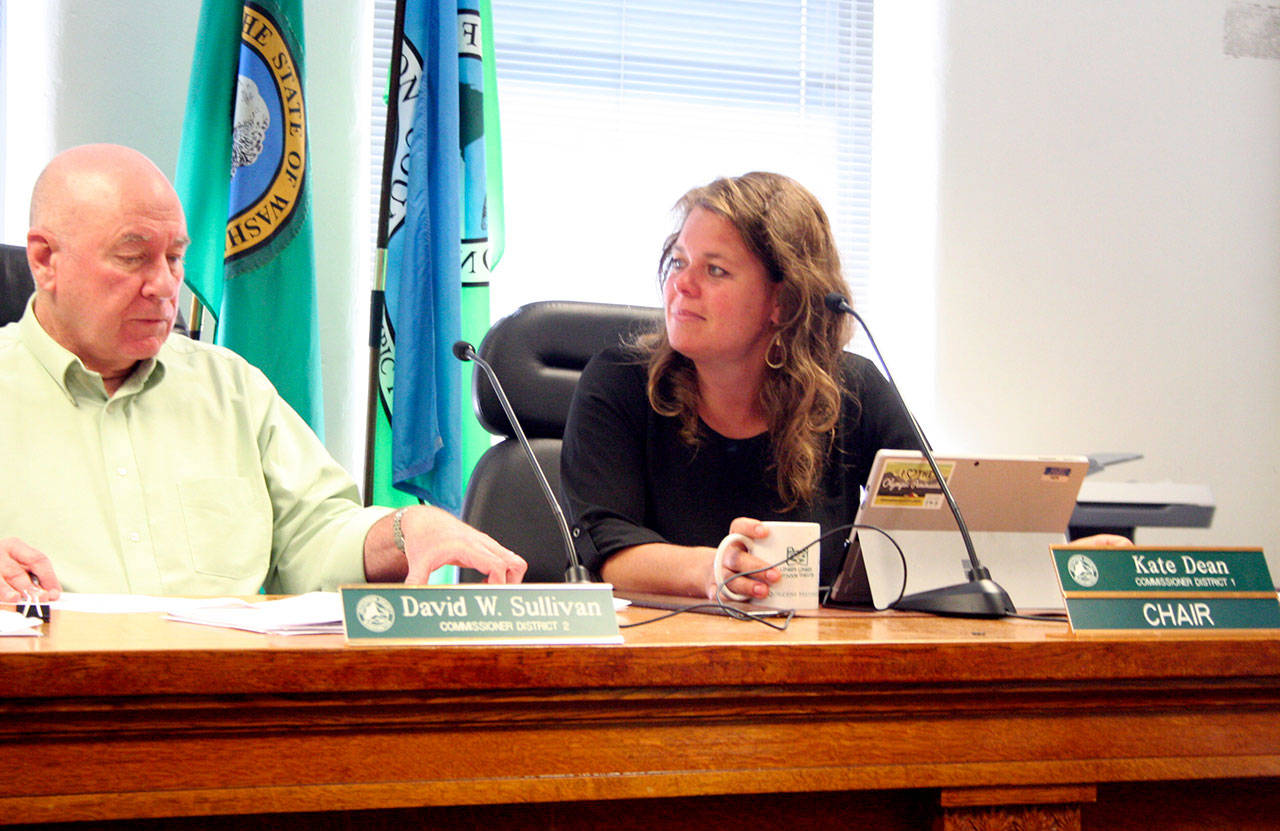PORT TOWNSEND — The Jefferson County commissioners plan to send a letter to Pope Resources and state agencies that oversee herbicide spraying to ask for alternative methods and to ensure adequate testing is in place to protect watersheds.
County residents continue to push public officials both at the county level and at the city of Port Townsend after aerial sprays that included glyphosate were applied by helicopter on private property last week.
Glyphosate is the active chemical in Roundup and the subject of a class-action lawsuit against Monsanto. States such as California list it as a cancer-causing chemical, but the federal Environmental Protection Agency won’t approve those labels for the product.
“We have taken a position of wanting to work with our constituents,” County Commission Chair Kate Dean said in her response to public comments Monday. “There’s an upward pressure that has to keep moving.
“We are just another version of you in that we try to use our collective voice to apply upward pressure.”
Pope Resources legally applied herbicide at multiple sites in the county last week with a chemical approved by the state Department of Agriculture and permitted by the state Department of Natural Resources.
Adrian Miller, Pope Resources’ vice president for corporate affairs and administration, said his company is aware of public comments and encourages the discussion.
“We’ve supported that process, and we think it’s an appropriate venue,” Miller said last week. “The regulation of these activities really is a statewide process.”
David Baker of Chimacum was part of the Jefferson County Environmental Coalition group that claims its members were sprayed Aug. 19 as they stood near state Highway 20 just south of Anderson Lake Road.
Baker told county commissioners at Monday’s meeting that he was walking along a service road for an hour and a half while the spraying occurred.
“It was never a strafing run like we picture,” he said.
“Never was I soaking wet. Never was I wiping liquid off. But I was sprayed left and right. It was in my lungs; I was breathing it. I tasted it. I smelled it.”
Ellen O’Shea, a co-founder of the environmental group, said her group attempted to call 9-1-1 four times, and the calls were transferred to the Jefferson County Sheriff’s Office and then to the State Patrol.
Neither agency was helpful, and some of the calls were dropped, she said.
O’Shea said she was told she needed to do research and call dispatch again with information on which laws were broken.
“I can’t figure out who’s in charge, but we should all have the same rights,” she said.
Commissioner David Sullivan, who sits on the JeffCom board, said he’ll look into how the situation was handled.
“I do expect a better response,” he said.
The county’s letter was unanimously approved to be sent to the state Aerial Herbicide Application Working Group, the state Pesticide Application Safety Committee, the state Forest Practices Board and several individuals including Gov. Jay Inslee, state Commissioner of Public Lands Hilary Franz and Thomas M. Ringo, the president and CEO of Pope Resources.
It states concern about the chemicals and impacts to water quality, and it asks for four points:
• Research other methods and best practices as alternatives to aerial spraying of glyphosate and other potentially harmful chemicals used in commercial forestry;
• Develop a testing and monitoring protocol for water quality in watersheds where toxic chemicals are applied;
• Require improved public notification when herbicide spraying is used;
• Prohibit the aerial application of known and suspected carcinogens.
Miller said Pope Resources voluntarily informs residents who live within 1,000 feet of planned spraying applications, and it has developed a website, www.popeneighbor2neighbor.com, to list area maps and chemical makeups of each application.
John Hamilton of Port Hadlock told county commissioners there were flags planted about 220 feet from his property line, and the helicopter did stay on the timberland side of the flags.
He also said he’s a military veteran who is fighting cancer he developed due to exposure to Agent Orange.
“Why would you expose yourself to that crap they’re dropping?” he asked the environmental group members who were at the protest. “I don’t get it, but that’s your choice.”
Hamilton said he witnessed a helicopter land at least four times to reload its reservoir with the chemical compound.
“I didn’t find on any of my [drift] cards any oily residue from overspray,” he said.
Dean told the crowd that Pope Resources is “hearing you guys loud and clear.”
At the same time, she expressed concern about reports of 9-1-1 calls not being investigated.
“We fully expect and have expressed to our sheriff the importance to do a fair investigation, and we also passed that message on to our prosecuting attorney,” she said.
The state Department of Agriculture and the state Department of Natural Resources also are investigating, she said, and the city of Port Townsend tested water samples at its treatment facility last week.
Results are expected this week, city Public Works Director Greg Lanning said.
“There’s no doubt when we look back at this time in history, we’re going to say, ‘What the hell were we doing?’ ” Dean said about the chemical use.
________
Jefferson County Managing Editor Brian McLean can be reached at 360-385-2335, ext. 6, or at bmclean@peninsuladailynews.com.


